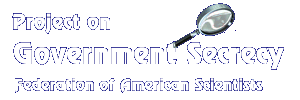 FAS |
Secrecy | 2001 News ||
Index |
Search |
Join FAS
FAS |
Secrecy | 2001 News ||
Index |
Search |
Join FAS

 |
|
|

Secrecy and Security News
Newer News: April 2001
March 2001
- Pollution Study at Lab Resumes by Jennifer McKee, Albuquerque Journal, March 29. "A federal study into 50 years of radioactive pollution at Los Alamos National Laboratory resumed last month -- almost a year after security fears at the lab forced out the team of government investigators conducting the project and nearly canceled the study altogether."
- CIA Inspector General on Historical Intelligence Budget Secrecy, letter to FAS, March 27. "Classification of 50 year old budget data does not constitute official misconduct or willful violation of the FOIA."
- National Archives to Open More Nixon NSC Materials, NARA press release, March 23. The Archives will open approximately 100,000 pages of materials from the Nixon
Presidential Materials Project on Thursday, April 5.
- Cloak and Dagger: Espionage a Fact of Life in Washington, CBSNews.com, March 23. "The White House decision to expel nearly 50 Russians it claims are intelligence officers may make diplomatic waves, but the presence of 'spooks' in the nation's capital is par for the course."
- Pentagon Press Briefing: Excerpt on FOIA and SecDef's Finances, March 22. "Why do we have to have a FOIA request for a public document like this involving the secretary's personal investments?"
- FBI to require lie detector tests on systems administrators by Dan Verton, Computerworld, March 22. "The FBI last week quietly expanded its use of the polygraph to cover systems administrators and all other employees with access to sensitive computer networks and databases."
- Former Adversaries Meet to Discuss Bay of Pigs, National Security Archive press release. At an international conference in Havana, former combatants, covert operatives, policy makers and Cuban government officials gathered to discuss one of the most infamous episodes in the Cold War�the April 1961 invasion at the Bay of Pigs.
- An Open Letter from Whistleblowers. "We ask for your help to resurrect one of the most important good government measures approved by Congress in this generation."
- Meeting of the DoD Historical Records Declassification Advisory Panel (HRDAP), Federal Register, March 21. The next meeting of this Pentagon advisory group will be held on March 30.
- Meeting of the Advisory Committee on the U.S. Nuclear Command and Control System, Federal Register, March 20. The first meeting will be held in closed session on April 5.
- Paradoxes of the Secret World by Vernon Loeb, InteligenCIA, Washington Post, March 19. "In a central paradox, the advantage of acting on secret information must always be weighed against the possibility of compromising its source."
- 11 New Members Added to Freedom of Information Act Hall of Fame, Freedom Forum press release, March 16. "This year's inductees represent a variety of backgrounds, including a former White House official, a member of Congress and public-interest lawyers representing various constituencies."
- Freedom of Information in the UK by Richard Wakeford, Free Pint, March 15. An informative essay with lotsa links on freedom of information, or the lack thereof, in the UK and elsewhere.
- Israeli author questioned on nuclear security by Dan Ephron, Boston Globe, March 14. "Authorities questioned an Israeli scholar for more than eight hours yesterday on suspicion that he committed security breaches by publishing a book on the history of the country's nuclear weapons program."
- Experts, Users Strategize on Security at Crime Summit by Dan Verton, Computerworld, March 12. "Despite the increased interest in protecting corporate secrets, some experts aren't convinced that the importance attached to secrecy is warranted... 'If I knew what the 11 herbs and spices used by Colonel Sanders were, I still couldn't compete with Kentucky Fried Chicken,' said Aftergood."
- Letter from Avner Cohen on Israeli nuclear secrecy, March 8. "When all factual discourse regarding nuclear issues is not allowed publicly, citizens cannot have even a semblance of an informed discussion. And informed discussion is the essence of democracy. I am convinced that the time has come to update the unwritten contract that Israelis signed with nuclear secrecy some two generations ago."
- The Spying Game Sometimes a Circle by Nancy Benac, Associated Press, March 6. "The list of classified information that FBI agent Robert Hanssen is accused of selling to the Russians is long on details about spies spying on spies.
- Establishment of the Federal Advisory Committee for the End-to-End Review of the U.S. Nuclear Command and Control System (NCCS), Federal Register Notice, March 6. "This advisory committee will provide advice and recommendations to the Secretary of Defense regarding the full range of U.S. Nuclear Command and Control System (NCCS) policies, responsibilities,
functions, management structures and capabilities.
- New Files Tie U.S. to Deaths of Latin Leftists in 1970's by Diana Jean Schemo, New York Times, March 6. "A recently declassified State Department document shows that Latin American officers involved in Operation Condor, the joint effort
in the 1970's by right-wing governments to crush left-wing opposition, used an American communications installation to share intelligence."
- Friends Spying on Friends: Washington Lists Allies Trying to Gather American Commercial Secrets by David Ruppe, ABCNews.com, March 5. "The United States says some of its closest allies are suspected of attempting to obtain U.S. commercial and technology secrets."
- Speaker Rates Polygraphs as Unreliable by Roger Snodgrass, Los Alamos Monitor, March 4. "Conventional lie-detecting is an outdated and dubious practice that is inherently biased against innocent people. That is the conclusion of William Iacono, who spoke Thursday at Los Alamos National Laboratory."
- First Bush National Security Directive Reorganizes the NSC by Dan Dupont, InsideDefense.com, March 2. "In his first national security directive, President Bush has abolished his predecessor�s system of National Security Council working groups and replaced them with eleven committees that will oversee key policy areas for the new administration."
- DoD's "Flirtation with Nuclear-Powered Satellites Ends, Analyst Says by Amy Butler, Inside the Air Force, March 2. "Budget constraints and recent advances in solar cell technologies have ended what one industry analyst calls the Defense Department's longstanding
�flirtation� with developing nuclear power sources for spacecraft."
- The Declassified Record of Ambassador Otto Juan Reich, a National Security Archive briefing book, March 2. "The Bush administration has floated the name of Otto Juan Reich for possible nomination as Assistant Secretary of State for Latin American Affairs."
- Attorney General Ashcroft on Polygraph Testing, excerpts from press conference, March 1. "I believe that there are applications for polygraph that are important, and ... that we should elevate the use of polygraph in certain cases as it relates to the Bureau."
- Middlebury grad won't face espionage charges, by Bruce Edwards, Rutland Herald (VT), March 1. "Unfortunately, it fits a pattern of lashing out by the Russian security services against foreigners who express any kind of interest in what they regard as national security topics," Aftergood said.
Older News: February 2001
 FAS |
Secrecy |
2001 News ||
Index |
Search |
Join FAS
FAS |
Secrecy |
2001 News ||
Index |
Search |
Join FAS
 http://www.fas.org/sgp/news/2001/03/index.html
http://www.fas.org/sgp/news/2001/03/index.html
 Maintained by Steven Aftergood
Maintained by Steven Aftergood



